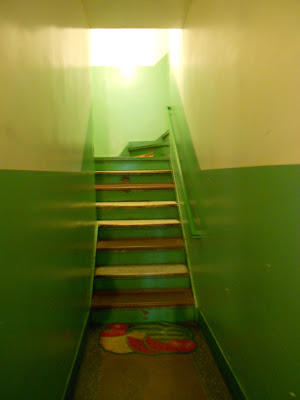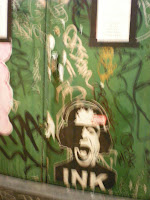I AM America.
I come from a long line of immigrants/refugees, artists and activists. These things are in my blood. They flow through me and bypass my brain cells, moving straight to my heart and soul. These charge my actions.
 My father supported Fidel Castro and his rebels during the political uprisings in late 1950's Cuba. He and his friends occupied a local radio station where they spoke for the people and against the abusive, dictatorial policies of the crooked and self serving Fulgencio Batista and his henchmen. In the decade that followed, when Castro's intentions to limit freedom of speech and to restrict human rights became clear, my father responded with dissidence.
My father supported Fidel Castro and his rebels during the political uprisings in late 1950's Cuba. He and his friends occupied a local radio station where they spoke for the people and against the abusive, dictatorial policies of the crooked and self serving Fulgencio Batista and his henchmen. In the decade that followed, when Castro's intentions to limit freedom of speech and to restrict human rights became clear, my father responded with dissidence.
When I was asked at school to wear the red kerchief of the Pioneers of the Revolution, he told me that belonging to a political group is something one chooses voluntarily, not as response to an external mandate. He further explained that before joining any group one must be informed about the beliefs, values and aims to which one is agreeing through membership. I would not be wearing the emblem of the communist youth party. I was the only girl in my class who didn't; though at the time I wished only that this small piece of cloth were not so heavy, but bore only the weight of the soft cotton from which it was sewn. I was 6 years old.
In those early years I saw very little of my father. He was jailed twice, once for buying meat on the black market, then for some other unpatriotic, irreverent act the details of which I can't now recall. I do vividly remember traveling with my family in the wee hours to visit him at the UMAP camp where he was assigned once he became labeled a counterrevolutionary "political enemy of the revolution". We brought him food, cigarettes, our love, my mother's tears and whatever news we thought he could still bear.
My father attempted to leave Castro's repressive government many times. Once he and a group of resourceful friends crafted a small raft, which they hid in the woods behind a nearby beach. The raft was soon thereafter discovered and seized by government officials, but fortunately neither my dad nor his friends were identified and they felt fortunate to have escaped being imprisoned. At another time he attempted to leave in an old fishing boat which capsized within the initial half hour of its fugitive voyage; all on deck were able swimmers and successfully made their way back to shore.
Finally in 1969 our family obtained permission to leave the country during what's been called "the largest airborne refugee operation in American history", the Freedom Flights. This was a small period of time, a hiatus if you will, during which there was some cooperation in the foreign relations between my two countries. I remember leaving behind my favorite dolls, all of my toys in fact, saying goodbye to my cousins, aunts, uncles, grandparents and friends. I would never see them again, though this was a concept too huge and complex for a small child to fathom. My mother never stopped crying. My father was stoic and attempted to distract us with a promise of giant rainbow lollipops upon arrival in our new land of opportunity, where he would be free to work again, at any job. We were now refugees.
We arrived in the U.S. with nothing but the clothes on our backs, but on this side of the ocean there were friends. They guided and supported us. They loved my father for his loyalty and integrity. People are important and they help each other; this too was an essential lesson to remember.
He put his broken heart aside and used his broken English and his business savvy to support our family, in fact, to do well for himself and make sure his children obtained an education of their choice. He did all of these things, and more.
On my first day of school in America he could sense my fear and apprehension. He reassured me with a hug and by giving me these words of empowerment to use as needed: "I don't speak English, but I want to learn." These words comprised the first sentence I learned in the English language. With this small lesson he opened my world and taught me how as an immigrant one must go forth and open each and every door. Courage, willingness, curiosity and a forever opening heart do that, as does language.
He taught me the importance of the voice, the power of the pen, of speaking up for one's beliefs and for what one believes to be correct and fair, the importance of speaking up for one's self and for those who can't or don't know how. These are the main things he sought when he came to America. His decision to leave my country--his country, was not an easy one for him to make; migration was (is) full of pain, uncertainty and loss. Being an immigrant one must overcome all of these things and summon the courage to suffer them for the sake of one's children and one's family and for those more abstract but vital rights that make up humanity: personal safety, freedom to love whomever one chooses, to say what one wishes, and to take care of one another fiercely and fearlessly, as we must do to survive.
My father paid upfront for these freedoms. I honor his gift.
I am an immigrant and this is my story.
 My father supported Fidel Castro and his rebels during the political uprisings in late 1950's Cuba. He and his friends occupied a local radio station where they spoke for the people and against the abusive, dictatorial policies of the crooked and self serving Fulgencio Batista and his henchmen. In the decade that followed, when Castro's intentions to limit freedom of speech and to restrict human rights became clear, my father responded with dissidence.
My father supported Fidel Castro and his rebels during the political uprisings in late 1950's Cuba. He and his friends occupied a local radio station where they spoke for the people and against the abusive, dictatorial policies of the crooked and self serving Fulgencio Batista and his henchmen. In the decade that followed, when Castro's intentions to limit freedom of speech and to restrict human rights became clear, my father responded with dissidence.When I was asked at school to wear the red kerchief of the Pioneers of the Revolution, he told me that belonging to a political group is something one chooses voluntarily, not as response to an external mandate. He further explained that before joining any group one must be informed about the beliefs, values and aims to which one is agreeing through membership. I would not be wearing the emblem of the communist youth party. I was the only girl in my class who didn't; though at the time I wished only that this small piece of cloth were not so heavy, but bore only the weight of the soft cotton from which it was sewn. I was 6 years old.
In those early years I saw very little of my father. He was jailed twice, once for buying meat on the black market, then for some other unpatriotic, irreverent act the details of which I can't now recall. I do vividly remember traveling with my family in the wee hours to visit him at the UMAP camp where he was assigned once he became labeled a counterrevolutionary "political enemy of the revolution". We brought him food, cigarettes, our love, my mother's tears and whatever news we thought he could still bear.
My father attempted to leave Castro's repressive government many times. Once he and a group of resourceful friends crafted a small raft, which they hid in the woods behind a nearby beach. The raft was soon thereafter discovered and seized by government officials, but fortunately neither my dad nor his friends were identified and they felt fortunate to have escaped being imprisoned. At another time he attempted to leave in an old fishing boat which capsized within the initial half hour of its fugitive voyage; all on deck were able swimmers and successfully made their way back to shore.
Finally in 1969 our family obtained permission to leave the country during what's been called "the largest airborne refugee operation in American history", the Freedom Flights. This was a small period of time, a hiatus if you will, during which there was some cooperation in the foreign relations between my two countries. I remember leaving behind my favorite dolls, all of my toys in fact, saying goodbye to my cousins, aunts, uncles, grandparents and friends. I would never see them again, though this was a concept too huge and complex for a small child to fathom. My mother never stopped crying. My father was stoic and attempted to distract us with a promise of giant rainbow lollipops upon arrival in our new land of opportunity, where he would be free to work again, at any job. We were now refugees.
We arrived in the U.S. with nothing but the clothes on our backs, but on this side of the ocean there were friends. They guided and supported us. They loved my father for his loyalty and integrity. People are important and they help each other; this too was an essential lesson to remember.
He put his broken heart aside and used his broken English and his business savvy to support our family, in fact, to do well for himself and make sure his children obtained an education of their choice. He did all of these things, and more.
On my first day of school in America he could sense my fear and apprehension. He reassured me with a hug and by giving me these words of empowerment to use as needed: "I don't speak English, but I want to learn." These words comprised the first sentence I learned in the English language. With this small lesson he opened my world and taught me how as an immigrant one must go forth and open each and every door. Courage, willingness, curiosity and a forever opening heart do that, as does language.
He taught me the importance of the voice, the power of the pen, of speaking up for one's beliefs and for what one believes to be correct and fair, the importance of speaking up for one's self and for those who can't or don't know how. These are the main things he sought when he came to America. His decision to leave my country--his country, was not an easy one for him to make; migration was (is) full of pain, uncertainty and loss. Being an immigrant one must overcome all of these things and summon the courage to suffer them for the sake of one's children and one's family and for those more abstract but vital rights that make up humanity: personal safety, freedom to love whomever one chooses, to say what one wishes, and to take care of one another fiercely and fearlessly, as we must do to survive.
 |
I am an immigrant and this is my story.



















































